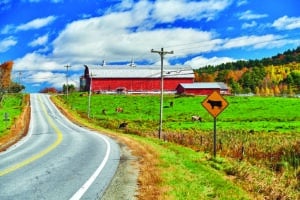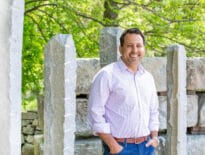
Walden Mutual hopes to attract depositors passionate about locally grown and raised food, and lend to farmers and processors in the same sector across the Northeast.
The backers of a new mutual bank under organization in New Hampshire say their effort could provide a template for a wave of new, mission-driven lenders and give a boost to existing mutual banks.
Walden Mutual filed its applications with New Hampshire regulators and the FDIC on Aug. 31, CEO Charley Cummings told Banker & Tradesman, and the bank-in-organization’s leaders hope to start accepting deposits in January of next year. The lender will be the first new American mutual bank organized in a half-century, and aims to focus its lending business on the local and organic agriculture sector.
The idea for the bank came from Cummings’ time as CEO of Walden Local, a retailer and distributor of locally raised meat and other farm products across the Northeast. Cummings stepped down from that role in January, and while the bank shares a name with the company, there is no formal relationship between the two organizations.
“We were in the position of lending to a lot of parts of our supply chain in the form of prepayments,” Cummings said.
The existing Farm Credit lending system’s ability to lend “stops at the farm gate,” said Steve Taylor, a Walden Mutual board member and a former long-serving state agriculture commissioner. This leaves many other parts of the local food supply chain, which are just as exposed to weather and other unique risks farms face, with challenges accessing bank loans. And most non-bank lenders offer interest rates too high for many agriculture businesses to afford.
Demand for more locally grown and organic produce from New England and New York is there, Taylor said – meatpacking capacity is so limited in the region, farmers “almost need to book a slot to get the animal slaughtered when the animal is born.” But producers and processors won’t be able to take advantage of growth opportunities without loan officers who understand, for example, that farms face serious earnings droughts in the spring when seeds are planted, fields are prepared, legions of temporary workers are hired, new land is leased and new equipment is bought.
Deposits with a Mission Sought
To gather deposits, Walden is trying to take advantage a market opening created by the rise of the local-food movement over the last 20 years, Cummings said. The bank will look for depositors across New York State and New England who want to put their money where their mouths are, literally, by supporting lending to local agriculture and the processors, retailers and community organizations that form part of the supply chain over the same area.
“There’s an entire new generation of people who are looking for a new alignment,” he said. “Banks in some ways have become black boxes and we often don’t think about where our dollars go when they’re placed in our deposit account, but ultimately they can go to a range of causes you’re passionate about [or not].”
The bank hopes to cast a wide net, geographically, thanks to the sudden relative affordability of digital banking products for lenders of all sizes, Cummings said. The pandemic has accelerated many bank customers’ move away from a need for in-person services on a day-to-day basis, making it possible for Walden to offer “very little in-branch services” and find customers comfortable with that Cummings said.
“I think the other obvious reason for us to go after a slightly larger physical market area than a typical community bank is because we’re focused on a specific sector. We need to focus on a larger area to diversify risk,” Cummings said.
New Hampshire’s deep cultural commitment to direct democracy and its significant agriculture sector made the state a natural place to incorporate, said Cummings, and likewise made it a matter of course to choose a mutual structure for maximum transparency to depositors.
And while Cummings himself has never run a bank before, Walden’s executive team will be stocked with industry professionals, including a COO with deep experience at Holyoke-based PeoplesBank, a CFO who played a similar role at the New Hampshire Community Development Finance Authority and a head of product who spent a decade directing Visa’s product development team.
A Path for Others to Follow?
Walden Mutual’s biggest impact may ultimately be seen in how it raises its startup capital.
That same belief in direct democracy that led Walden to incorporate as a mutual without a holding company means the bank had to create its own capital certificate for the special deposits state law and federal regulations say mutual banks need to get started. Since no mutual bank has been organized in the last 50 or so years anywhere in the United States, there were no model financial instruments the Walden team could turn to.
“They are effectively an equity-like security, in the sense that they’re non-cumulative perpetual deferred stock. … It functions in some way like a bond: a discretionary dividend payment, and no maturity date. And there’s no redemption rights,” Cummings said.
This old-yet-new tool let Cummings and his team access investment capital from mission-driven family offices instead of having to be reliant on the kindness of strangers, while also letting individuals chip in as little as $5,000 in seed capital.

James Sanna
“It really emerged that he only viable potential path from a capital perspective other than purely philanthropic capital analogous to a credit union,” he said. “And because of the amount of money we wanted to raise and the business model, I was pretty interested in raising investment capital that was looking for a social return along with an investment return.”
By proving out their capital certificate, Cummings hopes Walden will also be developing a tool that could let other, existing mutuals better access investment capital at a time that many banks need to evolve, without having to abandon their mutuality and convert to stock banks.
Once regulators dust off long-unused regulations and laws when reviewing applications from Walden and a handful of similar projects in other parts of the country, mutual de novos’ direct connection to communities could help address longstanding problems like banking deserts in minority-heavy neighborhoods and a lack of widely available financial products tailored to the needs of small minority entrepreneurs, said Tom Fraser, CEO of First Mutual Holding Co., a member-owned mutual holding company for a group of Ohio mutual banks.
“What Walden is doing, it’s bringing back to life something that’s worked for decades and centuries in the United States,” said Fraser, who is an adviser to the Walden effort and a planned new minority depository institution in Cincinnati. “I can’t think of a better form of banking that’s more important or more immediate to address the social issues we have today.”




 |
| 
